2021 ONTD Reading Challenge Around the World [JANUARY - SOUTH KOREA]
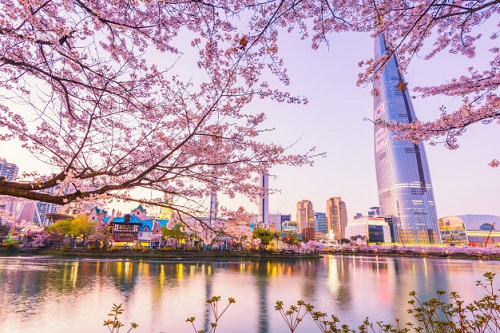
Hello everyone! Hope you are ready to get started on the 2021 ONTD Reading Challenge! Our January month is South Korea. So many interesting and original works from Korea have been translated in the past few years (lucky for us), so we have a lot of great options for this challenge and no excuses not to give it a try!
A quick announcement: the Goodreads group WILL still be updated, thanks to the very kind ONTDers krax and patchsassy. So if you like to keep track of your challenge over there, you can :)
We'll start with an introduction about South Korea, which OP hopes will help those who don't know much about the country to get more out of the books in the challenge. It turned out a bit long because it was difficult to summarize 1000+ years of history, and so much of it is relevant to the book recs, but I'll try to keep it shorter next time. You can obviously just skip it and go straight for the recs if you want.
South Korea
The Republic of Korea, aka South Korea, is located in the Korean Peninsula in East Asia. Its neighbours are North Korea (the Democratic People's Republic of Korea) and, across the Korea Strait, Japan. It's a pretty small country, about the size of Portugal or the US state of Indiana, with a population of about 50 million.
Korea has thousands of years' worth of history, although for a lot of that period it was actually different kingdoms. In the last thousand years, it was unified and ruled first by the Buddhist Goryeo dynasty (918-1392) then by the neo-Confucian Joseon dynasty (1392-1897). The metal moveable type printing press was invented in Korea during the Goryeo dynasty. Much of modern Korean culture, etiquette, norms, and societal attitudes towards current issues, and the modern Korean language and its dialects, derive from the culture and traditions of Joseon. [source]
However, during both dynasties, Korea was also invaded several times, notably by the Mongols, the Chinese and the Japanese. It was a tributary state to China for a long time. In Kyoto (Japan), still stands the Mimizuka, literally a giant tomb where the Japanese enshrined the severed noses of at least 38,000 Koreans they killed during the 1592-98 invasions of Korea (it's estimated they also cut off about 185,000 heads of Koreans as prizes). Well it didn't stop there for Koreans, who unfortunately don't have the most cheerful modern history. They’ve shown themselves to be tenacious fighters through so much adversity.
As the Joseon dynasty was falling apart in the late 19th century, Japan once again pounced. In 1904 Korea was already a Japanese protectorate; in 1905 the United States gave the Japanese carte blanche in Korea. In 1910 it was formally annexed. Koreans were forced to change their names and to speak Japanese only, and during World War II, hundreds of thousands of Korean women were forced into sex slavery by the Japanese army (they were known as "comfort women"). This is still a huge source of attrition with Japan til this day as the Japanese are less than interested in recognizing their war crimes.
As World War II was drawing to a close, the Korean peninsula was divided by the US and URSS during the Yalta conference into a capitalist zone and a communist zone along parallel 38, a division sanctioned by the UN. In 1949, China completed its own communist revolution. Stalin and Mao encouraged North Korea’s Kim Il-sung to invade the South, which he promptly did in 1950. This kicked off the Korean war, as a UN Security Council-approved intervention led by the US was dispatched to defend South Korea. UN forces pushed the North Koreans way past the parallel 38 almost to China’s border, but China’s military support of North Koreans eventually turned the tide back to the same parallel. Three years, 5 million dead (half of which were civilians) and countless separated families later, a cease-fire was agreed and the war was suspended (technically the Koreas are still at war). South Korea’s infrastructure was basically entirely destroyed.
After the war, South Korea went through various authoritarian governments under US influence, until direct presidential elections and a new Constitution were established in 1987. But amid the political turmoil its economy was bouncing back thanks to massive investment in education and industrialization. Korea became one of the 'Tiger Economies' of Asia.
Now Korea is the world's 9th largest economy (and that's taking into account the hit from covid), which is, frankly, badass, and it's seen as one of the most modern countries in the world. It's a technology hub and home to companies such as Samsung and Hyundai. Korean culture (food, tv shows, movies, music, books, etc) has been spreading gradually around the globe since the 1990s in what is known as the "Korean wave", generating soft power, tourism and exports revenue for the country.
Korean literature naturally reflects the complex Korean society, the country's tragic history and many of the issues facing men & women today in a high-pressure capitalist society still infused with pretty strict traditional Confucian values (especially hierarchy, patriarchy and filial piety).
Novels
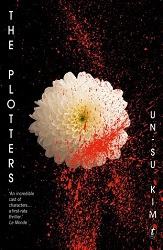
The Plotters (Un-su Kim)
OP note: Thrillers (and other 'genre fiction') are looked down upon in South Korea as not really literature but 'entertainment', but lucky for us, foreign publishers are starting to pick them up for translation (in 2021 we'll get our first Korean sci-fi book!). 'The Plotters' is set in a highly stylized underworld of assassins that will probably remind readers of John Wick - but it was written some years before the movie. Amid the bloodshed there is also some commentary on the democratization process and on capitalism. The author was unreachable in a deep-sea fishing expedition (for research) while The Plotters was the subject of a fierce auction between US publishers and sold for 6 figures.
The important thing is not who pulls the trigger but who’s behind the person who pulls the trigger-the plotters, the masterminds working in the shadows. Raised by Old Raccoon in The Library of Dogs, Reseng has always been surrounded by plots to kill-and by books that no one ever reads. In Seoul’s corrupt underworld, he was destined to be an assassin. Until he breaks the rules. That’s when he meets a trio of young women-a convenience store worker, her wheelchair-bound sister, and a cross-eyed obsessive knitter-with an extraordinary plot of their own.
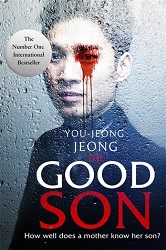
The Good Son (Jeong You-jeong)
ALSO TRY: Seven Years of Darkness
Early one morning, twenty-six-year-old Yu-jin wakes up to a strange metallic smell, and a phone call from his brother asking if everything's all right at home - he missed a call from their mother in the middle of the night. Yu-jin soon discovers her murdered body, lying in a pool of blood at the bottom of the stairs of their stylish Seoul duplex. He can't remember much about the night before; having suffered from seizures for most of his life, Yu-jin often has trouble with his memory. All he has is a faint impression of his mother calling his name. But was she calling for help? Or begging for her life? Thus begins Yu-jin's frantic three-day search to uncover what happened that night, and to finally learn the truth about himself and his family.

Please Look After Mom (Kyung-Sook Shin)
Winner of the Man Asian Literary Prize (first female author to do so)
ALSO TRY: The Court Dancer
OP note: This book was a million-seller in Korea, a huge feat. Despite earlier works in translation finding critical acclaim, this can be considered the first real foothold of Korean literature abroad in the mainstream.
This is the stunning, deeply moving story of a family’s search for their mother, who goes missing one afternoon amid the crowds of the Seoul Station subway. Told through the piercing voices and urgent perspectives of a daughter, son, husband, and mother, Please Look After Mom is at once an authentic picture of contemporary life in Korea and a universal story of family love.
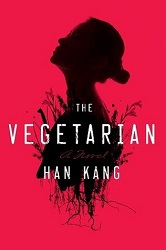
The Vegetarian (Han Kang)
Winner of the Man Booker International Prize
ALSO TRY: Human Acts, The White Book
OP note: Interestingly much of what is translated from Korean literature today is by women authors and has a distinct feminist and even subversive streak. The Vegetarian is probably the most obvious example. Possibly the most famous Korean book in translation (although not the best selling), this shocking and original tale can be credited with definitely making contemporary Korean literature a fixture of the international literary scene. This translation by Deborah Smith was pretty controversial, as she was accused of mistranslating bits and making additions to the text. But I would advise the reader not to get too hung up on that - Han Kang herself (who speaks English) has said that this translation was a collaborative process between her and Deborah. She seems pretty satisfied with it and worked with the same translator on two more books afterwards (so far). It's a gorgeous literary translation, and it's worth a read.
Before the nightmare, Yeong-hye and her husband lived an ordinary life. But when splintering, blood-soaked images start haunting her thoughts, Yeong-hye decides to purge her mind and renounce eating meat. In a country where societal mores are strictly obeyed, Yeong-hye's decision to embrace a more “plant-like” existence is a shocking act of subversion. And as her passive rebellion manifests in ever more extreme and frightening forms, scandal, abuse, and estrangement begin to send Yeong-hye spiraling deep into the spaces of her fantasy. In a complete metamorphosis of both mind and body, her now dangerous endeavor will take Yeong-hye-impossibly, ecstatically, tragically-far from her once-known self altogether.

The Hen Who Dreamed She Could Fly (Sun-mi Hwang)
ALSO TRY: The Dog Who Dared to Dream
This is the story of a hen named Sprout. No longer content to lay eggs on command, only to have them carted off to the market, she glimpses her future every morning through the barn doors, where the other animals roam free, and comes up with a plan to escape into the wild-and to hatch an egg of her own. An anthem for freedom, individuality and motherhood featuring a plucky, spirited heroine who rebels against the tradition-bound world of the barnyard, The Hen Who Dreamed She Could Fly is a novel of universal resonance that also opens a window on Korea, where it has captivated millions of readers.
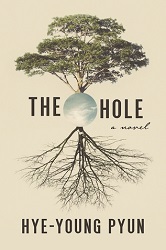
The Hole (Hye-young Pyun)
Winner of the Shirley Jackson Prize for Best Horror Novel
ALSO TRY: The Law of Lines
Ogi has woken from a coma after causing a devastating car accident that took his wife’s life and left him paralyzed and badly disfigured. His caretaker is his mother-in-law, a widow grieving the loss of her only child. Ogi is neglected and left alone in his bed. His world shrinks to the room he lies in and his memories of his troubled relationship with his wife, a sensitive, intelligent woman who found all of her life goals thwarted except for one: cultivating the garden in front of their house. But soon Ogi notices his mother-in-law in the abandoned garden, uprooting what his wife had worked so hard to plant and obsessively digging larger and larger holes. When asked, she answers only that she is finishing what her daughter started. As Ogi desperately searches for a way to escape, he discovers the difficult truth about his wife and the toll their life together took on her.
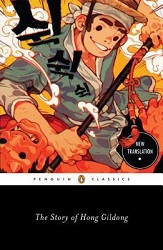
The Story of Hong Gildong (Unknown author / attributed to Heo Gyun, trans. Minsoo Kang)
OP note: If you would like to try something other than contemporary lit, this is one of maybe 3 classic Korean books in translation. During the Joseon dynasty, the king Sejong, the Great invented a whole new alphabet (Hangeul) especially for the Korean language. Before that, Koreans wrote using Chinese script, which was not very adaptable to Korean and hard as fuck to learn. Hangeul is meant to be so easy that you can learn it in one morning and king Sejong hoped to spread literacy among his people that way. This little novel is traditionally considered the first to be written directly in the new script, and attributed to a government official named Heo Gyun who allegedly harbored egalitarian ideas (he ended up gruesomely executed after getting involved in some Game of Thrones-style - or Kingdom-style, if you will - court plotting). Professor Minsoo Kang, responsible for this great translation, disputes the status of this novel as a pioneering work in Hangeul, Heo Gyun's authorship and his ideals, but Kang's research is still not widely accepted in Korea. Whatever the case, this is still a classic work of Korean fiction that has been adapted many times and is an idelible part of the collective Korean imagination. Kang's notes also teach the reader a lot about the Joseon period.
Hong Gildong, the brilliant but illegitimate son of a government minister, cannot advance in society due to his secondary status, so he leaves home to become the leader of a band of outlaws who rob the rich to give to the poor. On the way to building his own empire and gaining acceptance from his family, Hong Gildong vanquishes assassins, battles monsters, and conquers kingdoms.
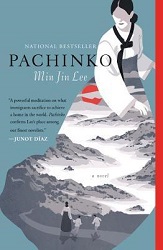
Pachinko (Min Jin Lee)
National Book Award Finalist
OP note: This book was written in English.
In the early 1900s, teenaged Sunja, the adored daughter of a crippled fisherman, falls for a wealthy stranger at the seashore near her home in Korea. He promises her the world, but when she discovers she is pregnant--and that her lover is married--she refuses to be bought. Instead, she accepts an offer of marriage from a gentle, sickly minister passing through on his way to Japan. But her decision to abandon her home, and to reject her son's powerful father, sets off a dramatic saga that will echo down through the generations.
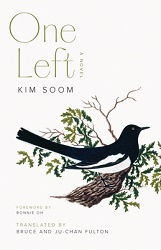
One Left (Kim Soom)
OP note: This is the first Korean novel about "comfort women", and it is based on the testimonies of survivors.
During the Pacific War, more than 200,000 Korean girls were forced into sexual servitude for Japanese soldiers. They lived in horrific conditions in "comfort stations" across Japanese-occupied territories. Barely 10 percent survived to return to Korea, where they lived as social outcasts. Since then, self-declared comfort women have come forward only to have their testimonies and calls for compensation largely denied by the Japanese government.
Kim Soom tells the story of a woman who was kidnapped at the age of thirteen while gathering snails for her starving family. The horrors of her life as a sex slave follow her back to Korea, where she lives in isolation gripped by the fear that her past will be discovered. Yet, when she learns that the last known comfort woman is dying, she decides to tell her there will still be "one left" after her passing, and embarks on a painful journey.
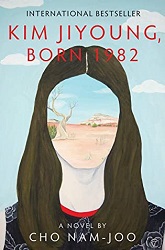
Kim Jiyoung, Born 1982 (Cho Nam-joo)
Longlisted for the US National Book Award for Translated Literature
OP note: This novel is a feminist indictment of the strict patriarchal Korean society. The million-plus bestseller (the first in Korea since Please Look After Mom) is about every Korean woman of the millenial generation, and to say it struck a chord is putting it mildly: it contributed to a huge cultural storm of female anger at women's oppression and societal backlash in the country, where feminism is seen as a dirty word. Singer Irene of Red Velvet was viciously insulted for merely saying she read the book. It was adapted into a movie, became a bestseller in neighbouring East Asian countries and was eventually translated to a dozen languages.
In a small, tidy apartment on the outskirts of the frenzied metropolis of Seoul lives Kim Jiyoung. A thirtysomething-year-old “millennial everywoman,” she has recently left her white-collar desk job-in order to care for her newborn daughter full-time-as so many Korean women are expected to do. But she quickly begins to exhibit strange symptoms that alarm her husband, parents, and in-laws: Jiyoung impersonates the voices of other women-alive and even dead, both known and unknown to her. As she plunges deeper into this psychosis, her discomfited husband sends her to a male psychiatrist.
In a chilling, eerily truncated third-person voice, Jiyoung’s entire life is recounted to the psychiatrist-a narrative infused with disparate elements of frustration, perseverance, and submission. Born in 1982 and given the most common name for Korean baby girls, Jiyoung quickly becomes the unfavored sister to her princeling little brother. Always, her behavior is policed by the male figures around her-from the elementary school teachers who enforce strict uniforms for girls, to the coworkers who install a hidden camera in the women’s restroom and post their photos online. In her father’s eyes, it is Jiyoung’s fault that men harass her late at night; in her husband’s eyes, it is Jiyoung’s duty to forsake her career to take care of him and their child-to put them first.
Jiyoung’s painfully common life is juxtaposed against a backdrop of an advancing Korea, as it abandons “family planning” birth control policies and passes new legislation against gender discrimination. But can her doctor flawlessly, completely cure her, or even discover what truly ails her?
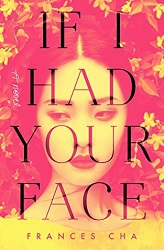
If I Had Your Face (Frances Cha)
OP note: This novel was written in English.
Kyuri is a heartbreakingly beautiful woman with a hard-won job at a "room salon," an exclusive bar where she entertains businessmen while they drink. Though she prides herself on her cold, clear-eyed approach to life, an impulsive mistake with a client may come to threaten her livelihood.
Her roomate, Miho, is a talented artist who grew up in an orphanage but won a scholarship to study art in New York. Returning to Korea after college, she finds herself in a precarious relationship with the super-wealthy heir to one of Korea's biggest companies.
Down the hall in their apartment building lives Ara, a hair stylist for whom two preoccupations sustain her: obsession with a boy-band pop star, and a best friend who is saving up for the extreme plastic surgery that is commonplace.
And Wonna, one floor below, is a newlywed trying to get pregnant with a child that she and her husband have no idea how they can afford to raise and educate in the cutthroat economy.
Together, their stories tell a gripping tale that's seemingly unfamiliar, yet unmistakably universal in the way that their tentative friendships may have to be their saving grace.

Almond by Sohn Won-pyung
OP note: This YA book was spotted being read by Yoongi from BTS.
Yunjae was born with a brain condition called Alexithymia that makes it hard for him to feel emotions like fear or anger. He does not have friends-the two almond-shaped neurons located deep in his brain have seen to that-but his devoted mother and grandmother aren’t fazed by his condition. Their little home above his mother’s used bookstore is decorated with colorful post-it notes that remind him when to smile, when to say "thank you," and when to laugh. Yunjae grows up content, even happy, with his small family in this quiet, peaceful space.
Then on Christmas Eve-Yunjae’s sixteenth birthday-everything changes. A shocking act of random violence shatters his world, leaving him alone and on his own. Struggling to cope with his loss, Yunjae retreats into silent isolation, until troubled teenager Gon arrives at his school and begins to bully Yunjae.
Against all odds, tormentor and victim learn they have more in common than they realized. Gon is stumped by Yunjae’s impassive calm, while Yunjae thinks if he gets to know the hotheaded Gon, he might learn how to experience true feelings. Drawn by curiosity, the two strike up a surprising friendship. As Yunjae begins to open his life to new people-including a girl at school-something slowly changes inside him. And when Gon suddenly finds his life in danger, it is Yunjae who will step outside of every comfort zone he has created to perhaps become a most unlikely hero.
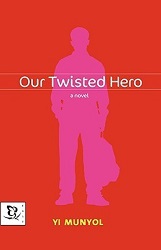
Our Twisted Hero (Yi Mun-yol)
OP note: This is a political allegory of Korea's transition from dictatorship to democracy, with themes of how totalitarianism can crush intellectual opposition, either by intimidation or assimilation. [source]
When the twelve-year-old narrator of Our Twisted Hero moves from Seoul to a small provincial town and enrolls in the local school, he's confident that his big-city sophistication will establish him as a natural leader. But he immediately falls victim to a charismatic and corrupt class monitor, who uses fear and violence to keep the other students under his mysterious spell and to assure his own supremacy in the school's social hierarchy. The teacher, grateful to have such a well-behaved class, turns a blind eye to the monitor's abuse of power. As the narrator attempts first to seek justice and then to inspire his fellow students to revolt, he finds himself in a fierce battle not just for his rights, but for his soul. Soon he has set in motion an unexpected and unstoppable chain of events. This riveting allegory starts as a simple power play within a children's classroom, but turns into a chilling tale about the lust for power and desperate need for acceptance that reside within us all.
Short stories
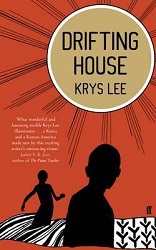
Drifting House (Krys Lee)
OP note: The short story is a prestigious form of literature in Korea, but we haven't had access to much of it in translation yet. 'Drifting House' was written in English; Ha Seong-nan's book of disturbing short stories below was translated. You can also check out the Yeoyu series of translated single short stories linked way below in the post.
Alternating between the lives of Koreans struggling through seventy years of turbulent, post-World War II history in their homeland and the communities of Korean immigrants grappling with assimilation in the United States, Krys Lee's haunting debut story collection Drifting House weaves together intricate tales of family and love, abandonment and loss on both sides of the Pacific.

Bluebeard's First Wife (Ha Seong-nan)
ALSO TRY: Flowers of Mold
Disasters, accidents, and deaths abound in Bluebeard’s First Wife. A woman spends a night with her fiancé and his friends, and overhears a terrible secret that has bound them together since high school. A man grows increasingly agitated by the apartment noise made by a young family living upstairs and arouses the suspicion of his own wife when the neighbors meet a string of unlucky incidents. A couple moves into a picture-perfect country house, but when their new dog is stolen, they become obsessed with finding the thief, and in the process, neglect their child. Ha’s paranoia-inducing, heart-quickening stories will have you reconsidering your own neighbors.
Non-Fiction

The Birth of Korean Cool: How One Nation is Conquering the World Through Pop Culture (Euny Hong)
OP note: Written in English. I know this cover is butt-ugly but this book is a very fun guide to the abrupt changes Korean society went through in the past few decades and to the origins of Korea's current cultural superpower status. I definitely recommend it!
As a child, Euny Hong moved from America to the Gangnam neighbourhood in Seoul. She was a witness to the most accelerated part of South Korea's economic development, during which time it leapfrogged from third-world military dictatorship to first-world liberal democracy on the cutting edge of global technology. Euny Hong recounts how South Korea vaulted itself into the twenty-first century, becoming a global leader in business, technology, education, and pop culture. Featuring lively, in-depth reporting and numerous interviews with Koreans working in all areas of government and society, The Birth of Korean Cool reveals how a really uncool country became cool, and how a nation that once banned miniskirts, long hair on men, and rock ‘n' roll could come to mass produce boy bands, soap operas, and the world's most important smart phone.

Love for Imperfect Things: How to Accept Yourself in a World Striving for Perfection (Haemin Sunim)
ALSO TRY: The Things You Can See Only When You Slow Down
No one is perfect, but that shouldn't hold us back from love--for the world, for one another, or even for ourselves. In this beautifully illustrated guide, Buddhist teacher Haemin Sunim draws on examples from his own life and on his years of helping others to introduce us to the art of self-care. When we treat ourselves with compassion, empathy, and forgiveness, we learn to treat others the same way, allowing us to connect with people on a deeper level, bounce back from failure, deal with feeling hurt or depressed, listen more attentively, express ourselves more clearly, and have the courage to pursue what really makes us happy so we can feel complete in ourselves.

The Magical Language of Others (E.J. Koh)
After living in America for over a decade, Eun Ji Koh’s parents return to South Korea for work, leaving fifteen-year-old Eun Ji and her brother behind in California. Overnight, Eun Ji finds herself abandoned and adrift in a world made strange by her mother’s absence. Her mother writes letters, in Korean, over the years seeking forgiveness and love-letters Eun Ji cannot fully understand until she finds them years later hidden in a box. As Eun Ji translates the letters, she looks to history-her grandmother Jun’s years as a lovesick wife in Daejeon, the horrors her grandmother Kumiko witnessed during the Jeju Island Massacre-and to poetry, as well as her own lived experience to answer questions inside all of us. Where do the stories of our mothers and grandmothers end and ours begin? How do we find words-in Korean, Japanese, English, or any language-to articulate the profound ways that distance can shape love? Eun Ji Koh fearlessly grapples with forgiveness, reconciliation, legacy, and intergenerational trauma, arriving at insights that are essential reading for anyone who has ever had to balance love, longing, heartbreak, and joy.
Graphic Novels

Moms (Yeong-shin Ma)
OP note: This graphic novel is based on notes by the author’s own mother, wherein at his behest she recorded her day to day life and thoughts. It depicts honestly the lives of four friends, all middle-aged women dealing with work, family problems and complicated love lives in a society that renders women of their age invisible.
With this boisterous and darkly funny manhwa, Yeong-shin Ma defies the norms of the traditional Korean family narrative, offering instead the refreshingly honest and unfiltered story of a group of middle-aged moms who yearn for something more than what the mediocre men in their lives can provide. Despite their less-than-desirable jobs, salaries, husbands, and boyfriends, these women brazenly bulldoze their way through life with the sexual vulnerability and lust typically attributed to twenty-somethings.
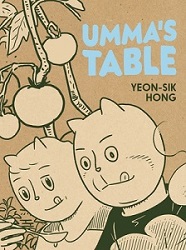
Umma's Table (Yeon-sik Hong)
OP note: This is an autobiographical graphic novel.
Madang is an artist and new father who moves to a quiet home in the countryside with his wife and young baby, excited to build a new life full of hope and joy, complete with a garden and even snow. But soon reality sets in and his attention is divided between his growing happy family and his impoverished parents back in Seoul in a dingy basement apartment. With an ailing mother in and out of the hospital and an alcoholic father, Madang struggles to overcome the exhaustion and frustration of trying to be everything all at once: a good son, devoted father, and loving husband. To cope, he finds himself reminiscing about their family meals together, particularly his mother's kimchi, a traditional dish that is prepared by the family and requires months of fermentation. Memories of his mother's glorious cooking-so good it would prompt a young Madang and his brother into song-soothe the family. With her impending death, Madang races to learn her recipes and bring together the three generations at the family table while it's still possible. This is a beautiful and thoughtful meditation on how the kitchen and communal cooking-in the past, present, and future-bind a family together amidst the inevitable.
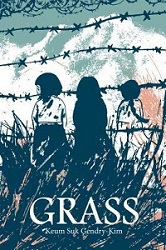
Grass (Keum Suk Gendry-Kim)
OP note: Based on the true story of a surviving "comfort woman", interviewed by the author.
Grass is a powerful antiwar graphic novel, telling the life story of a Korean girl named Okseon Lee who was forced into sexual slavery for the Japanese Imperial Army during the Second World War. Beginning in Lee’s childhood, Grass shows the lead-up to the war from a child’s vulnerable perspective, detailing how one person experienced the Japanese occupation and the widespread suffering it entailed for ordinary Koreans. Keum Suk Gendry-Kim emphasizes Lee’s strength in overcoming the many forms of adversity she experienced.
WANT MORE OPTIONS? OTHER LISTS OF BOOKS BY KOREAN AUTHORS
Stranger's Press Yeoyu series of contemporary Korean short stories
Penguin's List
The Guardian's List of recs
The Bamboo Traveller List of recs
United K-pop's List of recs
Books & Bao '10 Must Read Korean Novels in English'
Books & Bao '10 Best Korean Books of 2020'
Asian Review of Books '2020 Year in Translation from Korean'
10Mag's List of recs
Vanity Fair's List of recs
summaries / sources: 1 2 3 4 5 6 7 8 9 10 11 12 13 14 15 16 17 18 19 20
all write-up by OP
have you read any Korean books, ONTD? what will be your pick for January?